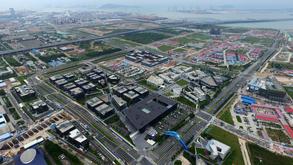 This undated file photo shows a view of Qianhai and Shekou Area of China (Guangdong) Pilot Free Trade Zone in Shenzhen, Guangdong province, China. (LIANG XU / XINHUA)
This undated file photo shows a view of Qianhai and Shekou Area of China (Guangdong) Pilot Free Trade Zone in Shenzhen, Guangdong province, China. (LIANG XU / XINHUA)
Restrictions on investments by Hong Kong and Macao businesses in Shenzhen’s Qianhai free trade zone (FTZ) will be further relaxed with the mainland city announcing the passage of two regulations as part of its efforts to create a more favorable business environment for overseas investors.
According to the regulations, which were recently approved by the local legislature, Qianhai will further lower its threshold for investment and work to eliminate all restrictions on Hong Kong and Macao enterprises to invest in the free trade zone.
According to new regulations, Qianhai will further lower its threshold for investment and work to eliminate all restrictions on Hong Kong and Macao enterprises to invest in the free trade zone
More efforts will be made on achieving full liberalization of trade in services between Qianhai and the two special administrative regions.
ALSO READ: Qianhai offers work incentives for HK, Macao talents
Procedures of setting up business in the FTZ will be further simplified, allowing qualified business entities from Hong Kong and Macao to operate in the zone once they finish the registration process.
The enactment of the regulations, which will come into effect from Oct 1, came as Shenzhen celebrated the 40th anniversary of its founding on Aug 26. The southern metropolis, which borders Hong Kong, has been a pioneer in carrying out opening-up and reforms over the past four decades.
The regulations aim to strengthen cross-border cooperation on innovation and envision the launch of a special cooperation area.
Universities, colleges and research institutes from Hong Kong and Macao will be given support to set up branches or innovation platforms there.
READ MORE: Qianhai expanding cooperation with HK
The regulations also call for innovations on the management model of foreign investment. In addition to an existing model that includes a negative list, the FTZ also introduced a new operational model that precludes intervention as long as enterprises don’t violate rules.
Market access restrictions concerning qualification, ownership ratio and business scope in finance, logistics, information service, technology service, medical care and other areas will be either eased or scrapped, as per the regulations.


